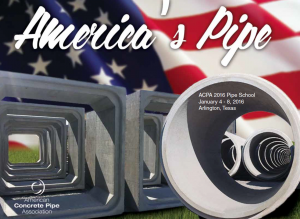In recent years, proponents of so-called “open competition” legislation have tried to convince Congress to add preferential language into highway legislation. This language forces states to spend precious resources justifying the use of concrete pipe materials. A sweetheart deal for the plastic industry, open competition legislation puts an unwanted burden on local officials – and strips the local engineer of the right to choose the best material for the project.
Different projects call for different pipes, and the ACPA supports the engineer’s freedom to use whichever pipe is best for the circumstance. The engineer should decide the appropriate pipe for the project – whether it’s concrete, plastic or metal. Open competition would undermine the ability of engineers, local governments and public works professionals to design infrastructure projects that best serve their communities’ needs.
For more than a decade, the ACPA has advocated in Washington, D.C., for the engineer’s right to choose. In 2012, Congress worked together to create a solution, putting the power to choose infrastructure project pipe materials in the hands of those who know best, the engineers. Congress knew that local experts are best suited to make decisions on what supplies are needed for their projects.
As ACPA advocates for engineers, we maintain a position that isn’t preferential only to our industry. Our goal is to make it fair to all industries and to allow the engineering community to make decisions on what pipe materials to use for federally funded projects. The engineering community and many State Departments of Transportation across the country have joined us in support of this position – that engineers have the experience in designing these projects and are the ones who should make the decisions, not the legislators.
To date, no open competition bill has been signed into law, but the plastic pipe industry has continued to push sweetheart legislation at the federal and state level. Individual states have remained in support of the engineer’s choice, because it’s the engineers who need to weigh the risks — especially for what type of pipe should be used for disaster-proof infrastructure. Concrete pipe is proven to be the strongest pipe available and is the most resilient choice for evacuation routes and disaster-proof infrastructure. Concrete pipe’s resiliency makes a tremendous difference in the long-term success of local projects.
What would happen if engineers aren’t allowed to make decisions on pipe materials in their states? If it were allowed, a dangerous precedent would be set for other building and infrastructure materials. Pavements, bridges and more could be specified by legislators, not by the engineers who are the experts.
As the American Concrete Pipe Association continues advocating in Washington for the engineer’s right to choose, let us hear from you. Leave a comment to encourage support for protecting the engineer’s choice, and consider contacting your member of Congress to ensure every voice is heard.


